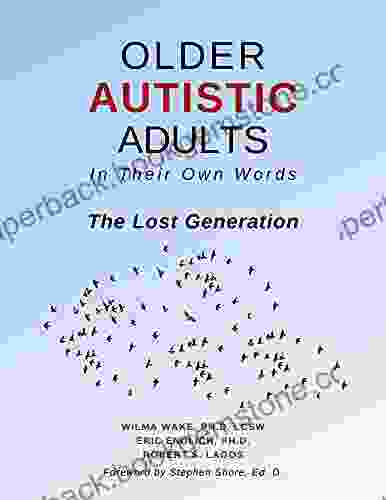Understanding the Experiences of Older Autistic Individuals
As society ages and the population of individuals with autism spectrum disorder (ASD) grows, it becomes increasingly important to understand the experiences of older autistic adults. This article presents the voices and perspectives of these individuals, offering insights into their unique needs, challenges, and strengths.
4.6 out of 5
| Language | : | English |
| File size | : | 23635 KB |
| Text-to-Speech | : | Enabled |
| Screen Reader | : | Supported |
| Enhanced typesetting | : | Enabled |
| Word Wise | : | Enabled |
| Print length | : | 402 pages |
| Lending | : | Enabled |
Navigating Social and Communication Challenges
"I've always struggled with social situations, and it's only gotten harder as I've gotten older," shares Emily, a 60-year-old with ASD. "People get impatient with me because I communicate differently, and I often feel isolated and misunderstood."
For many older autistic adults, communication can be a significant challenge. They may experience difficulties with understanding social cues, interpreting non-verbal language, and expressing themselves clearly. These barriers can make it challenging to maintain relationships and participate fully in social activities.
Sensory Sensitivity and Coping Mechanisms
"Bright lights, loud noises, and certain smells can be overwhelming for me," says John, a 55-year-old with ASD. "I have to be careful about where I go and how I interact with my environment."
Sensory sensitivity is a common trait among autistic individuals, and it can persist or even intensify with age. Older autistic adults may find certain stimuli, such as noise, light, and touch, to be particularly uncomfortable or even unbearable. To manage these sensitivities, they often develop coping mechanisms, such as wearing noise-canceling headphones or avoiding crowded places.
Cognitive and Executive Functioning
"My memory is not as sharp as it used to be, and I have difficulty with planning and organization," explains Sarah, a 70-year-old with ASD. "It can be frustrating to not be able to do things as well as I once did."
As individuals with ASD age, they may experience changes in cognitive and executive functioning. This can manifest as difficulties with memory, attention, problem-solving, and decision-making. These challenges can impact their ability to live independently and manage daily tasks.
Mental Health and Well-being
"I've struggled with anxiety and depression throughout my life," says David, a 65-year-old with ASD. "As I've gotten older, those challenges have become more pronounced."
Mental health conditions are common among autistic individuals, and they can become more prevalent as they age. Anxiety, depression, and obsessive-compulsive disorder are among the most frequently reported mental health concerns among older autistic adults. These conditions can significantly impact their overall well-being and quality of life.
Strengths and Resilience
Despite the challenges they face, older autistic adults often possess remarkable strengths. They may have developed unique coping mechanisms, such as strong self-awareness, specialized interests, and a deep understanding of their own needs.
"I've always been passionate about computers," says Michael, a 75-year-old with ASD. "I've built my own computer and I'm always learning new things about technology."
Many older autistic adults find solace and meaning in their special interests. They may be highly knowledgeable about specific topics and derive great joy from pursuing these interests. Additionally, they may have developed strong self-advocacy skills and a deep understanding of their own needs and preferences.
: A Call for Understanding and Support
As the population of older autistic adults continues to grow, it is crucial that society recognizes their unique needs and experiences. By listening to their voices and understanding their challenges, we can create more inclusive and supportive environments where they can thrive.
Older autistic adults deserve to live fulfilling and dignified lives. They have valuable contributions to make to society, and they deserve to be treated with the same respect and dignity as everyone else. By providing them with the necessary support and understanding, we can empower them to live full and meaningful lives.






























































































































































































































































































































































































































































































































































































